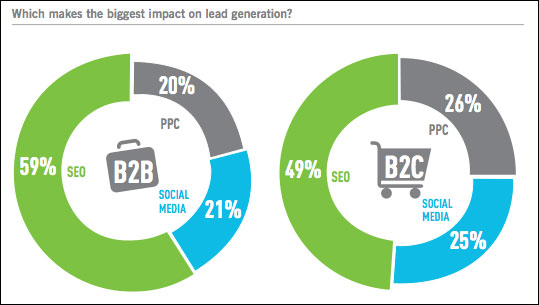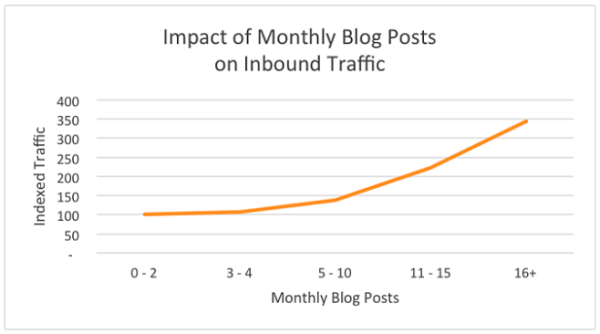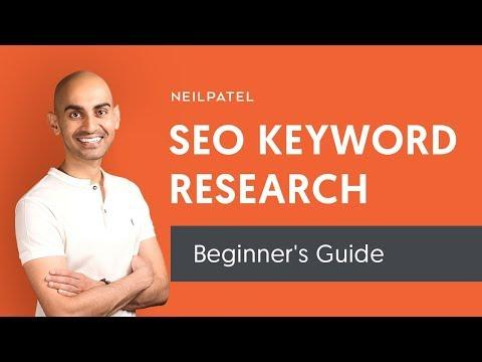Lead generation and SEO are among the two most important elements for creating an effective marketing plan to grow your business.
Lead generation involves cultivating interest in your business so you can attract qualified prospects to nurture and hopefully transform into customers and loyal brand ambassadors. No business can survive without leads.
Although lead generation and SEO are different, when you bring these two powerful strategies together, you will be able to drive massive growth for your business.
In this article, we take a look at seven SEO lead generation tips that you can use to grow your business.
Why SEO is important for your business
Search engine optimization (SEO) involves refining webpages to improve their ranking on the SERPs (search engine results pages). The higher your web pages rank, the greater the likelihood that Google and other search engines will display your pages to users for relevant search queries.
SEO is an all-encompassing term that describes everything that you do to achieve higher visibility for your site and its content online. This includes everything from embedding keywords on your website to link building and social media marketing, and so on.
- SEO is crucial for your business because it gives you more visibility online. It drives organic traffic to your website, which, in turn, leads to more leads and customers - and ultimately more sales and growth for your business.
- SEO also helps your website to stand out from your competitors online. By implementing the proper SEO tactics, you will be able to rank well, get found by your target audience, and maximize your lead generation.
- SEO, when done correctly, can lead to a consistent stream of qualified traffic to your website from search engines on a daily basis. If you understand how to convert website traffic to potential customers, this is where you’ll be able to capitalize on the traffic. For example, if you’re a local business, by placing a call now button on your website you can increase call volume to your physical location(s), which will allow you to create new customer relationships regularly.
How does SEO impact lead generation?
As previously mentioned, SEO and lead generation are two different strategies. SEO is focused on adjusting and editing the different aspects of your site so that it ranks high in search engines and drives more web traffic.
Lead generation, on the other hand, has to do with increasing the number of customers and prospects for your business.
The connection between them comes down to the impact that SEO has on lead generation.
SEO can complement a business’ lead generation efforts by increasing awareness for the company through organic traffic to the website. The more often your website shows up on Google's first page, the easier it is for your target customers to find you and learn more about your business’ solutions.
According to the majority of marketers online, SEO is better than other marketing strategies, including PPC for generating leads.

There are many different ways to effectively use SEO to boost your lead generation efforts, including:
- Auditing your website
- Performing keyword research
- Updating existing on-page content
- Benchmarking your competitors’ performance
- Creating an ongoing content marketing strategy
- Creating a backlink strategy
Great SEO helps you please both search engines and website visitors. It allows you to optimize your website for search algorithms without sacrificing the experience of your readers. By doing this, you ensure that your website is primed for generating as many leads as possible organically.
7 SEO tips to boost lead generation
Now that you understand that SEO is one of the most effective ways to boost your client base, increase sales, and grow your business, let's take a look at seven SEO tips to boost lead generation. If you want to learn more, you might consider taking an SEO course to boost your knowledge.
1. Build a blog with SEO-optimized content
One of the best ways to use SEO to get more leads is to build an active blog with optimized blog posts. A blog combines all the elements you need for great website SEO. By posting content regularly, you are essentially providing fresh content, keywords, backlinking, images, social media engagement and so on.
Here are some of the basics of SEO optimizing your blog:
Use keywords: Do keyword research to find the most important keywords in your industry, and then embed them in your headline and throughout your blog content. Just remember to keep it natural and avoid stuffing keywords, as this might result in penalties from Google.
Publish regularly: To get the most from your SEO efforts, you need to create content consistently. As evidenced by the graph below, the more frequently you post to your blog, the better results you will get.

Use subheadings: Using H2, H3, and H4 headings helps to make your content scannable and improves your user experience. It will also help Google to more easily understand what your content is all about.
Add links: Each time you publish a post on your blog, you must link it to other relevant content on your website. This improves usability, boosts page views, and helps to spread the link juice.
Format content: Your content must not only be packed full of value, but it must also be very easy for your readers to consume and digest. Use formatting best practices to make your content easier to read and more engaging.
Keep in mind, it doesn’t matter what kind of blog you have, these best principles should always be followed.
For example, if you’ve built a lifestyle blog you should still follow all of these SEO best practices to attempt to increase your traffic, which will inevitably increase the likelihood of more leads entering into your ecosystem.
Keeping SEO in mind from the start of your blog launch is what will lead to consistent growth and business growth opportunities.
2. Increase your website speed
Website speed affects search engine rankings. Google's main goal is to provide its users with the best experience possible, and the speed at which your website runs is a massive factor in helping them achieve that goal.
The faster your website responds to search, the higher Google will rank it.
Here are a few basic ways to increase website speed:
- Use a reliable web hosting provider
- Make your website mobile responsive
- Use an image optimizer plug-in like TinyPNG
- Optimize your scripts using a plug-in like WP Fastest Cache
- Remove unnecessary scripts and plugins
- Fix broken links and delete spam comments
- Clean up your database using a plugin like WP-Optimize
- Enable caching using WP Total Cache (or MaxCDN if you're not using WordPress)
You can use a tool like Pingdom to help you check your website speed. Once you know how your site is performing, you can start to improve your load times based on the suggestions the tool makes.
3. Conduct keyword research
Keyword research is a critical element of successful SEO. It involves finding terms that users type into search engines when searching for information, products or services. When done right, keyword research can be a solid foundation of all your online marketing efforts and help drive every decision you make.
There are many keyword research tools that you can use to find the relevant keywords that lead to your website so you can drive more traffic, increase sales, and get a great ROI from your marketing.
This value-packed video from Neil Patel shows how you can conduct keyword research in as little as 60 seconds.

4. Start link building
Link building is the activity of acquiring links from other sites to your own. Links help users to easily navigate between pages on the web. They also help search engines to crawl between individual pages on your site, as well as between entire websites on the internet.
Link building is an important element in your overall SEO lead generation strategy, but it's important to do it credibly if you want to get positive results from your efforts.
For instance, you must never buy links and only link to high-quality sources that will help improve the ranking of your own domain. Manual outreaching to bloggers for guest posting and link placements is still a very credible way to build links.
Make a list of people you’d like to reach out to. Come up with a subject line that works well in your niche (Hunter’s guide is a great help here) and explain the benefits of accepting your offer (maybe offer them something in return) in the body of the email.
This article from Moz goes into more detail on how to get started building powerful links for your website.
5. Use local SEO strategies if you are a local business
A website offers you the opportunity to make your business visible to the entire online world. In contrast, local SEO is more focused on helping you rank higher in the area where your business operates.
If you have a local business, then you stand to benefit greatly from using local SEO strategies to ensure that your audience can find you on Google.
Use the following local SEO strategies to benefit your business:
- Claim listings in online directories: Use online directories to build and market yourself so you can create a stronger presence online.
- Optimize content for local search: Use local keyword data to optimize your content and tell your audience exactly who you are and where you are.
- Generate positive reviews: Studies show that over 88% of consumers trust reviews online as much as recommendations from family and friends. Always ask for reviews, the more positive reviews you have, the more leads you will get.
6. Have active social media channels
If you aren't sure exactly how social media helps SEO, you are not alone. Many marketers are confused about the impact that social media has on SEO.
Google says that social signals are not among its ranking factors, but data from Search Engine Journal shows that social media can help your website rank better.
The data shows a very high correlation between ranking position and social signals, with the top-ranking pages on Google displaying significantly more social signals than the websites that don't perform as well.
It could be argued that social media has an indirect correlation with SEO because the more of a social media presence you have, the more likely you are to attract those who will link to you.
For example, if you’re a writer who uses social media to attract more visitors/leads to your site, the actual visits to the site itself aren’t as important to SEO as the potential links you may get from people who see your content and link to you from OTHER websites.
So make sure you maintain active social media channels to help boost your SEO lead generation campaigns.
7. Promote and manage customer reviews
Customer reviews positively impact SEO, as well as your overall rankings. They act as a strong signal to Google and other search engines that your website is trustworthy and authoritative (the positive reviews, anyway).
Here are some basics behind utilizing them effectively:
Encouraging reviews: A great way to start acquiring reviews from your customers is to simply ask for them. Also, make it as simple, easy and convenient as possible for people to leave a review to make it more likely that they will do so.
Responding: For each of your customers who leaves you feedback - whether good or bad, take the time to acknowledge it. By responding to each review, you are showing your customers that you value their opinions.
Repositioning: The digital prominence of your business plays a role in Google's rankings. The search giant looks at your business' involvement online to determine where to rank you in search. So make sure you position your business in the best light in order to improve your SEO.
Here are some ways you can do that:
- Make sure your articles are written by a credible content creator with a good reputation on the web.
- Make sure all URLs associated with your business have useful content.
- Make sure your business responds to all comments, reviews, and conversations that are happening around it.
- Make sure you’re using an SEO reporting tool to keep track of the important factors such as keyword usage, URL compliance, link clicks, etc. The insights you gain from these tools help you a lot in online repositioning.
All these tactics come together to help you reposition your business in the best light possible.
They give you an edge over the competition and help you show Google that you’re putting your customers first. They also boost your SEO because more customer feedback means more keywords, which will lead to more income for you and your business.
Conclusion
From creating an SEO-optimized blog to maintaining active social media channels, each of these seven SEO lead generation tips will allow you to experience consistent growth in your business.

Ron Stefanski is an internet entrepreneur and marketing professor who has a passion for helping people create and market their own online business. You can learn more about Ron by visiting OneHourProfessor.com.
You can also connect with him on YouTube or LinkedIn, or on his Facebook Community.


